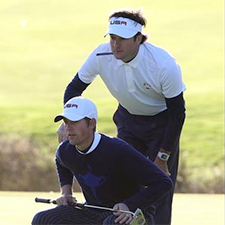At this weekend’s Ryder Cup, you will see twenty four of the best golfers in the world compete against each other. This seems to happen every week on the PGA Tour, but the Ryder Cup is unique in many ways. The players are representing their countries and continent on a team instead of as individuals. They are also playing many different match play formats instead of individual stroke play. Let’s further examine some of the differences between match play and stroke play, as well as the different formats used during the Ryder Cup and some terms that go along with them.
The biggest difference in match play versus stroke play is that in match play you are playing against an opponent or side, unlike stroke play where you are competing against the entire field. A “side” is a player or two or more players who are partners. Another difference in match play and stroke play is how they are scored. In stroke play, as you know, everyone keeps their own score and you must complete each hole by holing out. Match play is played by holes and the score is expressed by saying so many “holes up” or “all square,” and so many “holes to play.” And the term “dormie” is when you are as many holes up as there are holes to play. If a side is dormie at the Ryder Cup, they are guaranteed at least a half point because there are not extra holes played if the match ends all square.
Another notable difference is that in match play, a player or side can concede a match, a hole, or an opponent’s next stroke. A player’s next stroke can be conceded at any time by his opponent, as long as the ball is at rest. He is considered to have holed out with his next stroke. A concession cannot be taken back after it has been made and it cannot be declined by the player whose stroke is being conceded. In Four-Ball and Foursomes match play, if one of the partners concedes a stroke to an opponent, the player’s partner cannot withdraw that concession.
There are three formats of match play used in the Ryder Cup: Four-Ball, Foursomes, and Single or Individual match play. Four-Ball match play, often referred to as best-ball, is where two players play their own ball throughout the hole and use the better score of the two as their score for the hole. They are competing against the better ball of their two opponents. When players are partners on the same side, they can give each other advice and also accept advice from their partner’s caddie, in addition to their caddie. Partners can also determine the order in which they play when it is their side’s turn to play.
Foursomes involves each side playing only one ball throughout the hole, alternating play from each teeing ground as well as throughout the play of each hole. Before a match partners should determine who will tee off on all of the odd numbered holes and the other player will tee off on the even numbered holes. Something to note about the order of play, is that if a side incurs a penalty, for instance hitting the ball into a water hazard, the order of play is not affected. Therefore, the player who hit the ball into the water would not hit the next shot, his partner would. If a player plays when his partner should have, the side loses that hole.
The last form of match play is simply individual match play, where one player competes against one opponent. Another difference between stroke and match play is the order of play. In stroke play, if a player plays out of turn there is no penalty and the stroke counts. But in match play, if a player plays when his opponent was actually further from the hole, or plays from the tee when he did not have the honor, the opponent can recall the shot and make the player play it again. There is no penalty to the player who plays out of turn and alternatively, the opponent can choose to let the stroke stand.
There are numerous other subtleties of match play that are found in the Rule book, but these are some of the key points to pay attention to during the Ryder Cup and in your own match play situations. Hopefully the Americans can put together the right combinations in all of these forms of play and bring the Cup back to Team USA!


